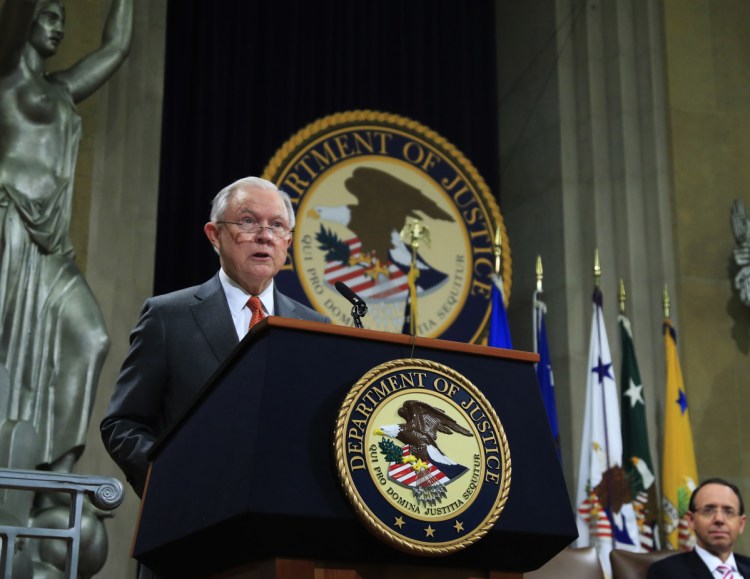Attorney General Jeff Sessions announced Monday the creation of a religious liberty task force to help protect the right of every American “to believe, worship, and exercise their faith in the public square.” At first glance, such an effort sounds innocuous, even laudable. But as with much this administration does, a closer look reveals a different story.
The concept of religious liberty has always been a core American value, but the phrase has become a rallying cry for conservatives specifically in recent years. President Trump has even made religious liberty a top priority for his administration. In a blink, a historically uncontroversial concept became a point of contention.
Why?
Because in the hands of conservatives, the phrase has morphed in meaning. It’s time we’re honest about what this term once meant, what it now means and which policies it represents.
Religious liberty has long held a prominent place in American parlance. Our Founding Fathers hailed from various religious traditions, but they shared a vision for a nation where all citizens had the right to worship freely. They sought to prevent the creation of a state-sponsored church like the Church of England and, to that end, guaranteed in the First Amendment of the Constitution: “Congress shall make no law respecting an establishment of religion, or prohibiting the free exercise thereof.”
‘INCLUSIVE PLURALISM’
George Marsden, a religious historian at the University of Notre Dame, describes our founders’ goal as “inclusive pluralism.” In the society they envisioned, no religion is preferred over another, and all believers can worship as they see fit.
The phrase “religious liberty,” as understood by its constitutional origin, attracts little controversy. One strains to recall any prominent Americans who have called for either the establishment of a national religion or the abolition of Americans’ right to worship the deity of their choosing (or none at all).
But the historical, constitutional definition and the modern, conservative definition of religious liberty are two separate things.
In the hands of the Trump administration, the phrase connotes freedoms and privileges granted mostly to Christians – specifically, the white conservative Christians who form a vital part of the Republican base. Instead of inclusive pluralism, it now stands for exclusive primacy of the Christian faith.
Trump never hid his revamped vision for religious liberty. During the 2016 campaign, he convened 1,000 evangelical leaders in New York City and proclaimed, “This is such an important election. And I say to you folks because you have such power, such influence. Unfortunately, the government has weeded it away from you pretty strongly. But you’re going to get it back.”
He even promised that, if he was elected, Americans would drop all the “Happy Holidays” nonsense and start say “Merry Christmas” again. (Last December, he claimed that he successfully revived the traditional Christian holiday greeting.)
NOW A POLICY AGENDA
To this end, Trump swore to destroy the Johnson Amendment, a 1950s law that prohibits churches from campaigning for a political candidate. In May, Trump signed a religious liberty executive order surrounded by more than a dozen Christian leaders that granted them broad exemptions for politicking.
At the signing, Trump declared, “We are giving our churches their voices back.”
But what about mosques or other non-Christian houses of worship? Trump’s supporters would surely say that his agenda protects them, too. But that’s not the way it plays out.
The Trump administration has attempted to block refugees from certain majority-Muslim countries from immigrating, but the president said he might prioritize the applications of Christians from those same regions.
And what about the treatment of religious minorities here at home? We hear almost nothing about their protection. And unlike the 70 percent of Americans who claim to be Christian, these minorities are actually at risk.
There have been several well-publicized stories in recent years about citizens in majority-Christian neighborhoods in this country attempting to block the construction of mosques. Nary a peep is heard from many conservative religious liberty groups in these cases. Those that do speak up are chastised into silence.
Today, religious liberty is more than a core value. It’s also policy agenda. It describes the desire to dismantle Obamacare and to shield Christian business owners who refuse service to LGBT people.
Just as conservatives co-opted the seemingly harmless phrase “family values” in the 1980s and 1990s to provide cover for their crusade against same-sex marriage, so now they often use “religious liberty” as a dog whistle to signal the “right” to discriminate against same-sex couples.-
Send questions/comments to the editors.



Comments are no longer available on this story